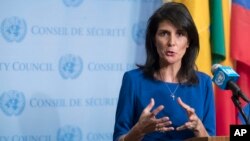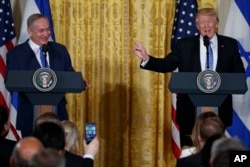The U.S. Ambassador to the United Nations says the Trump administration "absolutely" supports a two-state solution to the Israeli-Palestinian conflict.
"The two-state solution is what we support," Nikki Haley told reporters after attending her first Security Council meeting on the long-running conflict. "Anybody that wants to say the United States does not support a two-state solution, that would be an error."
The council’s regular monthly meeting on the situation happened to come a day after Israeli Prime Minister Benjamin Netanyahu met with President Donald Trump in Washington.
During a joint news conference Wednesday, President Trump appeared to make a major departure from nearly two decades of U.S. policy, declaring that he “could live with” either a one or two-state solution to the conflict.
The international community has for years firmly supported two contiguous states – Israel and Palestine – living side-by-side and achieved through direct negotiations as the only viable solution to the 70-year old conflict.
“We absolutely support a two-state solution,” Haley said repeatedly. “But we are thinking out of the box as well, which is what does it take to bring these two sides to the table? What we do we need to have them agree on?”
She said that ultimately any solution is going to come from the Israelis and the Palestinian Authority and that “the United States is just there to support the process.”
Firm international support for two states
“The two-state solution remains the only way to achieve the legitimate national aspirations of both peoples,” said Nickolay Mladenov, the U.N. Special Coordinator for the Middle East Peace Process.
Speaking via a video link from Jerusalem, Mladenov told council members that each side could demonstrate goodwill – the Israelis by stopping settlement expansion and construction, and the Palestinians by tackling violence and incitement. He said such moves would create an environment conducive to bilateral final status negotiations.
On Wednesday, U.N. chief António Guterres told reporters during a visit to Cairo that the two-state solution is the only option, adding, “there is no Plan B.”
In January, France hosted a conference to reaffirm international support for two-states and establish a package of incentives to encourage the parties to move toward this solution.
“We consider that the two-state solution has never been so threatened and yet so necessary,” France’s U.N. Ambassador François Delattre told reporters. “Threatened by settlements and violence; necessary because it is our view the only political option that answers both the Palestinian need for justice and the Israeli need for security.”
Britain’s ambassador, Matthew Rycroft, welcomed the Trump administration’s interest in striking a peace deal “that meets the requirements of both parties as a positive step”, and reiterated his country’s support for a two-state solution.
“President [Mahmoud] Abbas stated yesterday clearly, that we are committed to the end of the occupation, to the two-state solution and to the implementation of Security Council resolutions, including 2334,” Palestinian U.N. envoy Riyad Mansour told reporters.
Resolution 2334 was adopted at the end of 2016 and declared settlements an obstacle to peace and called on Israel to halt construction. “We are committed to this process, and we believe that this is the shortest distance to putting an end to this conflict,” Mansour added.
On Wednesday, President Trump called on Prime Minister Netanyahu to “hold back a bit” on settlement building. Israel has surged ahead approving thousands of new units in recent weeks, despite the adoption of U.N. resolution 2334.
Trump has also nominated as his ambassador to Israel New York lawyer David Friedman, who is a well-known supporter of settlements and opposes a two-state solution. Thursday, Friedman faced senators and protesters who disrupted his hearing on Capitol Hill, where he was grilled on some of his past comments.
"Ironclad support" for Israel
Ambassador Haley also vigorously reaffirmed U.S. support for Israel, accusing the United Nations of an anti-Israel bias that Washington “will not turn a blind eye to” anymore.
“I’m here to underscore the ironclad support of the United States for Israel,” Haley told reporters. “We will never repeat the terrible mistake of resolution 2334,” she said of the settlements resolution.
She said “outrageously biased” resolutions from the Security Council and General Assembly have made peace harder to reach, “by discouraging one of the parties from going to the negotiating table.” Haley said Washington would not hesitate to speak out against these biases.






